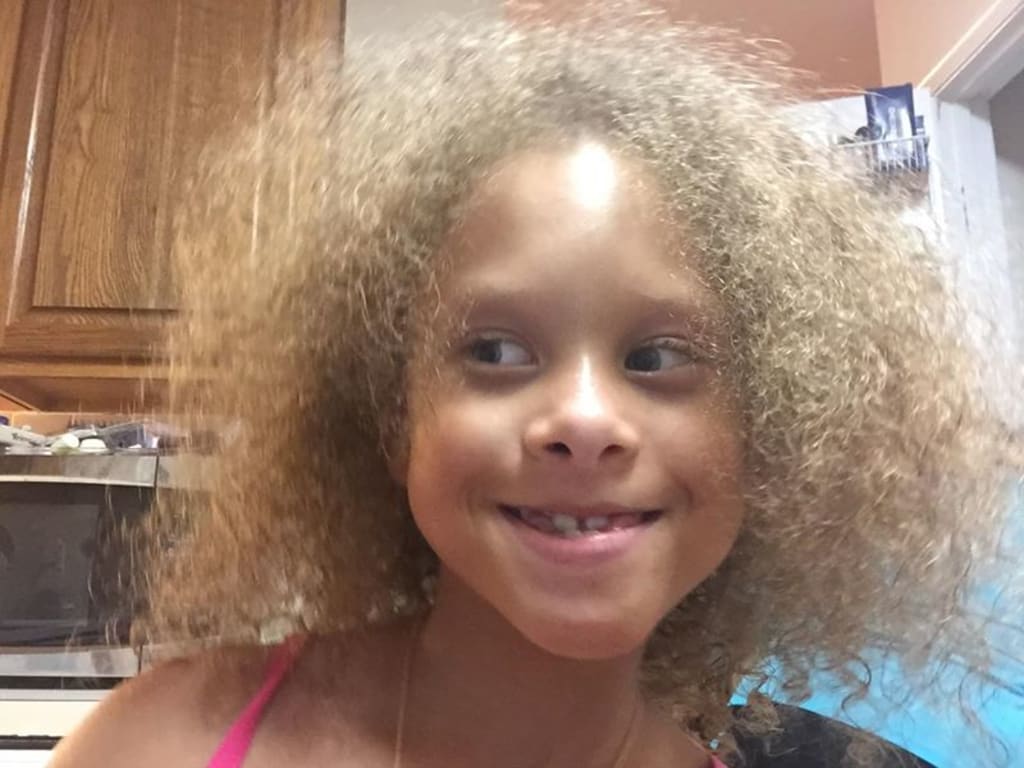Entry #2: Relationship with My Mother??? It's Complicated
I thought I was ready to write this one, and then I started writing it.

"Kailyn's chewing her rubber bracelet, again. She's going to swallow it and choke one of these times," my mother says as we walk down the street towards a restaurant.
"Well, she has poor oral motor skills because of her brain injury, mom" I try to explain.
"But she looks crazy chewing on a toy like that in public. She's too big for that! She's chewing on a toy, but when we get in this restaurant, she isn't going to chew her food. I'm telling you she's going to choke"
"Once again, mom. She's got a disability..."
It's something mothers of kids with disabilities put up with all the time. I would love to tell you that disabled kids go home to loving, accepting families who loving supporting the parent in meeting the child's needs and even attend every training session, doctor's visit, evaluation.... That's the ideal, not the norm.
My child is my mother's first grandchild. I know she never thought she would have a disabled grandchild, and her definition of "disabled" is colored by her own experiences. She loves having a grandchild; especially one that looks just like her. She goes to every practice and every performance. Those are the normal things. Everyone dances, does sports, plays music, and performs at school. She marks off every grandparent's day on the calendar so she can attend. Those are the things she can enjoy and feel very natural.
"Mom, if you would just accompany me to one doctor's appointment you might learn more about Kailyn's condition and some of the ways it is managed." I hate to tell you, I'm too used to the response she's about to give me. I've heard to so many times; it's just routine.
"I'm not listening to that nonsense! You're just looking for someone to give you an excuse because you know you're a bad parent. You ain't raising that child right."
Now, before you jump on my mother, you have to remember her point of view is colored by past experiences. She was born poor during legal segregation. I will never know what it was like to see signs saying "coloreds only" or "whites only." I know being a young child during segregation left my mom with an overgrown sense that everyone is judging you by your outward appearance; moreover, you will never be more than your outward appearance.
So, yes, as my child is bouncing around, making strange, loud noises repeatedly all while chewing on a neon pink rubber bracelet, my mother grows gravely concerned about how her family is being perceived. In her mind, we're supposed to be walking in a straight line down the sidewalk, with straightened hair swept neatly into tight buns, decked in brand name clothing, barely being heard or noticed by anyone. I assure you my child and I don't look like that picture of respectability.
"I don't know why you don't do more for her, if she has such a disability. You shouldn't expect her to do so much," my mother nags, chomping down on turkey chili nachos. "If she's disabled, why does she play piano? You spend all that money on piano lessons and look at her clothes. Her shoes look beat up. Why do you let her out in public in old clothes and beat up shoes?"
My daughter rolls her eyes. Even she is visibly annoyed by the nagging. But she loves it when her grandmother goes to her practices. I'm impressed that my daughter has learned to defend herself instead of internalizing my mother's criticism. My mother continues, "You're just a bad parent and you don't care about anything. You're failing at raising your child and everyone can see that."
Once again, I ask you not to jump on my mother. Before my child, her only experience with disabled people was with her sister's child. My aunt had a child with Down syndrome in a time when doctors only recommended institutionalization. She may have only been 15. She may have been a poor, black teenager without a high school degree. She was also absolutely determined to care for her own child. When my mom and grandmother arrived at the hospital, doctors were refusing to show my aunt her new baby girl. My aunt was hysterically screaming, "Give me back my baby! I want my baby! Why can't I see my baby?" It took a long time of convincing, but the hospital finally allowed them to leave with my cousin in tow. They also sent social workers to the house constantly for a year.
My mom spent her teenaged years playing lookout, dressing my cousin in expensive clothes, and helping my aunt take care of a child who never said more than three words, couldn't go to school, and watched her cousin depend entirely on her mother for everything. To this day, my cousin has never learned to rely on anyone but her mother. She still says the same three words, has been repeatedly in and out of hospitals for drastic procedures. I've seen my aunt become seriously ill and still drag herself out of bed to meet her child's needs. Fifty years later her greatest fear is still the institutionalization of her daughter.
My mom looks at my cousin and looks at my daughter and the word "disabled" just doesn't compute. Not for HER grandchild. Her grandchild is a pianist, a beauty queen, a gymnast, a dancer, and has never once been held back in school. Her grandchild goes to private school and is going to fourth grade. My cousin could do none of that, so how can her grandchild be disabled?
But how can she deny what she saw? She was there the day my twins were born and intubated on the spot. She watched them struggle to breathe on their own. She watched my deceased daughter slowly pass, and yelled at the nursing staff every time my surviving daughter couldn't drink from a bottle. She held my daughter in the NICU, covered in wires and tubes. She agonized the four months my daughter's bassinet was empty. The day we could all finally go home, my mother picked the perfect little outfit, and a $300 car seat to bring her grandbaby home. She probably tuned the discharging doctor completely out as he said, "Now she was born early enough for her brain development to be impacted, so don't be surprised if she gets older and there are differences." I guarantee you she wasn't listening. She just wanted her grandchild.
Y'all, my mom could NOT be separated from my daughter as a baby. She fed her, changed her, carried her around everywhere — even as she went to the toilet. We went to church and my mom carried her impeccably dressed grandchild everywhere. Then she noticed her grandchild was drastically smaller than other kids and she didn't want to be seen as the grandmother of a sick child. Then her hair got long enough to curl and my mother nearly lost her mind. Then the 235 paged medical record of hospitalizations, specialists, therapists, diagnoses, evaluations put her grandchild further and further away from "normal".
Now my mother doesn't know what she's looking at. There's a giggling, frizzy-haired child with melted cheese all over her shirt and face that has been smeared into her eyebrows sitting across from her. It jumps up suddenly making an awkwardly loud noise, knocking over its plate and spilling its drink. That is NOT her grandchild. It is her daughter's crazy child suffering from terrible parenting — that is NOT a disability.
My mom quickly ejects from the table and the entire situation... "I'll meet y'all in the car," she says moving quickly out the door and disassociating completely from the crazy people at the table. She is distinguished and refuses to be judged any other way. I clean the table up and gather my child.
"Where's Grandma?" she asks.
"She's warming up the car so it will drive better." That's what I tell my daughter.
About the Creator
Kimberly Nicholls
I'm a parent of a disabled child and everything that comes along with that. She receives SSI and we're on SNAP. That's right, we rely on government assistance, but we are both looking to use our talents and abilities to be great.






Comments
There are no comments for this story
Be the first to respond and start the conversation.